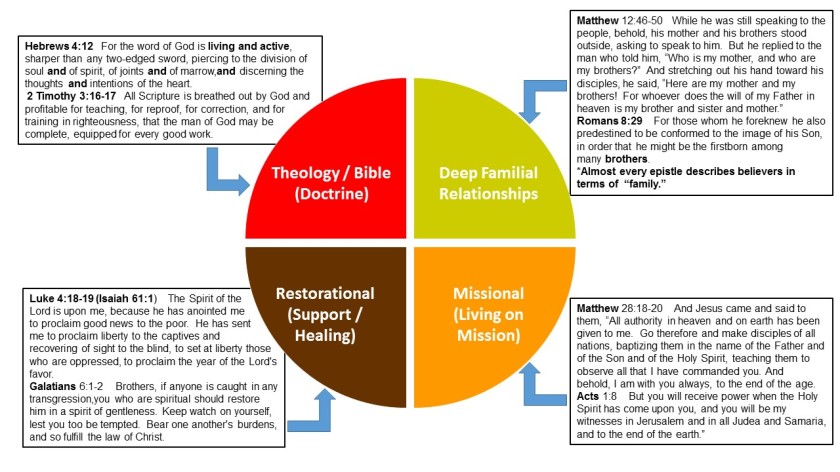
Transformational discipleship involves moving people from sitting
in rows, where they are simply in proximity to one another, to sitting
in circles. From there, they move into community with one another.
When Eric Geiger and I were writing Transformational Groups, we studied 2,300 churches sponsored by 15 denominations. Fewer than half of those churches said they had a plan for discipling people. Only 63 percent had
someone responsible for the spiritual formation of children, students, and
adults.
The majority of these churches weren’t satisfied with the state of disci-
pleship or spiritual formation. We know there is a great level of dissatisfaction in many churches about where they are on the issue of discipleship, but what is the solution?
We also conducted a Transformational Discipleship study of more than 4,000 Protestant churchgoers in North America and asked them about spiritual formation. One of the five items most predictive for spiritual maturity was participation in a small class or group of adults such as a small group, Bible study, or adult Bible fellowship.
But what makes a small group thrive? Our studies discovered five elements of a transformational small group environment: mission orientation, Word-driven mentality, multiplication mindset,
stranger welcoming, and kingdom focused.
MISSION ORIENTATION
First, every small group should be mission oriented and focused on becoming part of and following God in His mission for the world. When someone becomes a believer, he or she takes on the responsibility of being globally minded; this mindset contributes to his or her spiritual growth and maturity.
WORD-DRIVEN MENTALITY
Second, small groups need to be firmly rooted in the Scriptures, which are a source of life and growth. Sharing life’s struggles and encouraging one another is a healthy part of any community. But too much sharing can make the group seem like a support group. The needs people share in the group need to always be hedged-in and examined through the lens of Scripture.
MULTIPLICATION MINDSET
A third aspect of transformational discipleship groups is a multiplication
mindset. The purpose of a group is to eventually reproduce into another group that is making and growing disciples of Christ. This element of small groups helps members stay open to change and inviting to new people.
For this element to function effectively, church leaders need to relinquish
ministry and leadership into the hands of believers in their church and not cling tightly to power. While groups can multiply under the leadership of an elite few in the church, the possibilities of growth are minuscule compared to what occurs when the laity leads small groups.
STRANGER WELCOMING
A fourth element of small groups is that they welcome strangers. Small groups must always be aware of new people in the church and new people in their groups, intentionally creating a welcoming and relational environment for them. Without this the group becomes inward-focused and loses sight of the mission to make more disciples.
KINGDOM FOCUSED
A fifth and final component of transformational groups is a kingdom-focused mindset. Group members need to stay focused on what God wants to accomplish in their time together, not how they can be the most exciting small group in the church. Groups cannot exist for the sole purpose of emotional support for their members, but must find their
place in God’s greater plan of advancing His kingdom.
Transformational discipleship can happen when small groups focus on God’s mission, His kingdom, and His word, and when they are welcoming to strangers and intent on multiplying. All of this begins when people move out of the pew and into circles in order to be in community
with one another and provoke one another to love and good deeds. This is
essential.
Small groups that produce transformational discipleship are essential not only to the spiritual growth and maturity of church members but also to
the advancement of the gospel.
ED STETZER (@EdStetzer) is executive director of LifeWay Research. For more visit www.EdStetzer.com



